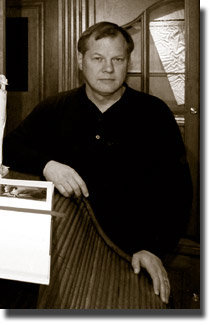|
|
|
|
|
|
|
|
|
Starting
with the milestone of open-heart surgery, W. Randolph Chitwood Jr. brought new
hope to patients with cardiovascular disease in eastern North Carolina. An internationally
recognized leader in cardiac surgery innovations, he serves as chief of surgery
and director of the Heart Center.
 The son and grandson
of country doctors, Chitwood carried his father's bags on house calls
in his home of Wytheville, Va. From an early age he felt inspired to help
people. The son and grandson
of country doctors, Chitwood carried his father's bags on house calls
in his home of Wytheville, Va. From an early age he felt inspired to help
people.
 "I saw how much
he did for folks up in the mountains and that always intrigued me,"
he said during an interview with William Friday in July, 2000. Using tools
his grandfather never imagined, he set out to continue that work. "As
I advanced, I tried to do more advanced technology." "I saw how much
he did for folks up in the mountains and that always intrigued me,"
he said during an interview with William Friday in July, 2000. Using tools
his grandfather never imagined, he set out to continue that work. "As
I advanced, I tried to do more advanced technology."
 That technology includes
using robotic devices that function inside a patient's heart, replacing
the surgeon's human hands with a machine's perfect stability. Even the
steadiest hands move unintentionally." That technology includes
using robotic devices that function inside a patient's heart, replacing
the surgeon's human hands with a machine's perfect stability. Even the
steadiest hands move unintentionally."
 The robot, called da
Vinci, also strengthens the surgeon's non-dominant hand and allows more
range of motion. The robot, called da
Vinci, also strengthens the surgeon's non-dominant hand and allows more
range of motion.
 The first step toward
this remarkable invention came in 1984, when Chitwood performed the hospital's
first open-heart surgery. Building on this success, he oversaw expanding
the service by adding more staff and resources for heart procedures. The first step toward
this remarkable invention came in 1984, when Chitwood performed the hospital's
first open-heart surgery. Building on this success, he oversaw expanding
the service by adding more staff and resources for heart procedures.
 By 1993, the hospital
opened its Heart Center, making cardiac surgery more available to a region
that desperately needed it. By 1993, the hospital
opened its Heart Center, making cardiac surgery more available to a region
that desperately needed it.
 Chitwood has focused
on technology, but also strives to reach and heal people the old-fashioned
way, by paying close attention to them. And in 1994, he also underwent
bypass surgery. Chitwood has focused
on technology, but also strives to reach and heal people the old-fashioned
way, by paying close attention to them. And in 1994, he also underwent
bypass surgery.
 "The individual
patient will tell you what the problem is, if you can just listen,"
he said. "That is something I learned at home. I didn't learn it
in my training." "The individual
patient will tell you what the problem is, if you can just listen,"
he said. "That is something I learned at home. I didn't learn it
in my training."
 His role in these innovations
also includes helping introduce minimally invasive heart surgery at the
hospital in the mid-1990s. This process uses tiny incisions rather than
traditional methods which involve sawing the chestbone, cutting muscle
tissue and which cause substantial trauma to the patient. By inserting
miniature endoscopic cameras into the body, doctors can perform valve
repair and bypass. His role in these innovations
also includes helping introduce minimally invasive heart surgery at the
hospital in the mid-1990s. This process uses tiny incisions rather than
traditional methods which involve sawing the chestbone, cutting muscle
tissue and which cause substantial trauma to the patient. By inserting
miniature endoscopic cameras into the body, doctors can perform valve
repair and bypass.
 Chitwood, who is also
chairman of the Department of Surgery at the Brody School of Medicine,
believes teaching young doctors will greatly improve the lives of heart
patients. In fall, 1999, a second da Vinci robot arrived in Greenville
which he and other surgeons will use for operations and teaching. By spreading
the techniques, he can help even more people. Chitwood, who is also
chairman of the Department of Surgery at the Brody School of Medicine,
believes teaching young doctors will greatly improve the lives of heart
patients. In fall, 1999, a second da Vinci robot arrived in Greenville
which he and other surgeons will use for operations and teaching. By spreading
the techniques, he can help even more people.
 In the future, he hopes
to see ongoing work providing better care for heart disease. By 2020,
he said, he hopes surgeons can operate on the heart, inside the body -
while it is still beating. Growing heart cells and inserting them into
the heart also offers promise. In the future, he hopes
to see ongoing work providing better care for heart disease. By 2020,
he said, he hopes surgeons can operate on the heart, inside the body -
while it is still beating. Growing heart cells and inserting them into
the heart also offers promise.
 "There are a lot
of things that are going to happen,' he said. "I think we are living
in a fascinating time." "There are a lot
of things that are going to happen,' he said. "I think we are living
in a fascinating time." |
|

